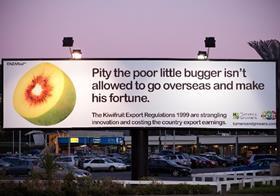
New Zealand exporter Turners & Growers (T&G) has continued its campaign against the single-desk kiwifruit export system operated by Zespri by erecting another billboard that calls for an overhaul of what it describes as the country's 'outdated' kiwifruit regulations.
Comparing its own ENZARed-branded red kiwifruit variety to a young New Zealander in search of overseas experience, T&G's latest salvo continues its recent argument that New Zealand's 1999 Kiwifruit Export Regulations are restricting innovation and denying the country potential export earnings.
The 12-metre long billboard, which shows ENZARed alongside the message 'Pity the poor little bugger isn't allowed to go overseas and make his fortune', has been put up at Wellington Airport.
'The big overseas experience is a right of passage for thousands of bright young Kiwis each year and one red-hearted Kiwi is making a very public plea for the chance to head overseas with his mates and earn valuable export dollars for New Zealand,' the company said in a statement.
T&G managing director Jeff Wesley said the new billboard message was timely given comments made this week by John Allen, chief executive of the New Zealand Ministry of Foreign Affairs and Trade (MFAT).
Mr Wesley said MFAT officials had been placed in a difficult position, suggesting their stated support for Zespri would ultimately be 'doomed' when it came to the 'cut and thrust of free trade negotiations'.
'They’re trying to talk tough, for an international audience, but ultimately free trade is just that and you can’t have one commercial company with this type of competitive privilege,' Mr Wesley commented.
'In the commercial world, if New Zealand is serious about its push for innovation and doubling the value of its exports, it has to recognise the proprietary rights of those who own kiwifruit varieties,' Mr Wesley said.
T&G currently holds the global intellectual property rights to ENZAGold and ENZARed, as well as the regional rights to trademarked green variety Summerkiwi.
'Proprietary varieties do not need government regulated Single Points of Entry, they have them by default,' Mr Wesley argued. 'Just as Zespri does with its own Gold variety.'
According to Mr Wesley, T&G is one of New Zealand's export success stories. The company’s concern at the alleged need for changes to the existing regulatory environment – something he said would encourage investment, R&D, exports and innovation – was, he insisted, echoed by business leaders in this week's Mood of the Boardroom, an annual survey of business leaders conducted by the NZ Herald.
'We take New Zealand’s best from the soil to the world plate – it’s what we do,' he continued. 'We have successfully taken more new fruit and vegetable varieties to the world than any other company in New Zealand. We need kiwifruit regulations that recognise the world has moved on since 1999 and New Zealand risks being overtaken.'
Work done by T&G and subsidiary Enza to develop, promote and sell new kiwifruit varieties in international supermarkets had delivered a 'significant boost to global interest' in the kiwifruit category, he said, adding that the present collaborative marketing system, which allows third-party kiwifruit exporters to sell their product overseas with the approval of industry regulator Kiwifruit New Zealand, was now a licence for anti-competitive behaviour.
'That system was set up in the days when Zespri was a grower cooperative and we only had green kiwifruit,' he said. 'Owners of new varieties are now up against what is an ordinary company, owned by shareholders but protected by an extraordinary market position.
'It is not in the commercial interest of that company to promote a competitors products, nor is it in the interests of competitors to hand over their valuable IP and investment to Zespri.'
'The situation we have where Zespri as the owner of one PVR (Plant Variety Right) variety can exercise control over the commercial destiny of PVR varieties owned by others is ridiculous,' Mr Wesley concluded.
T&G estimates that its new kiwifruit varieties could earn New Zealand up to half a billion NZ dollars per year in export earnings (€277m).



